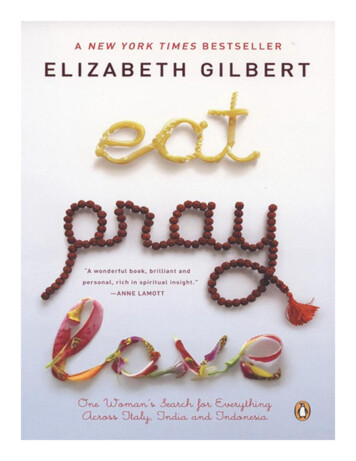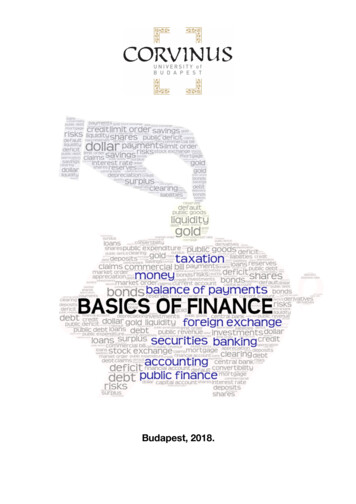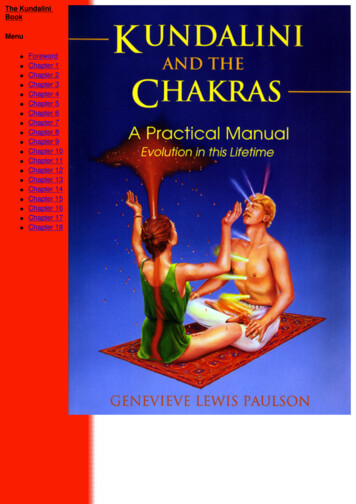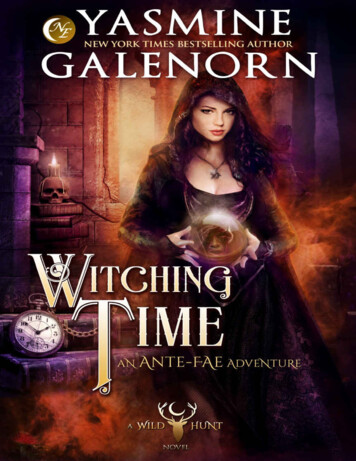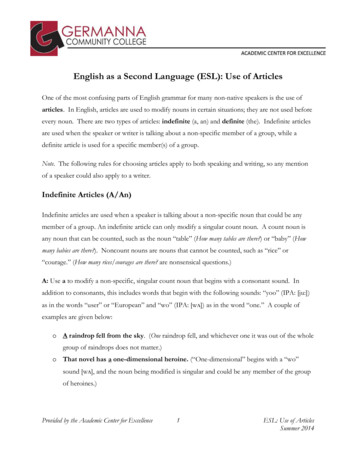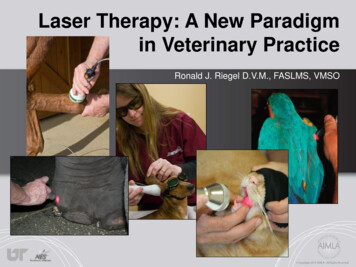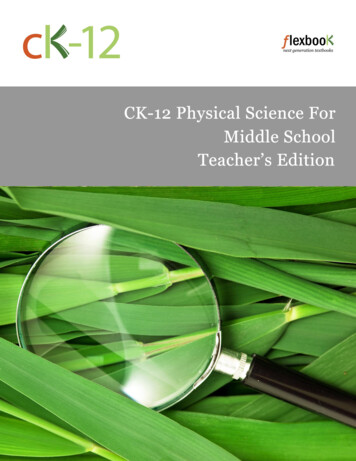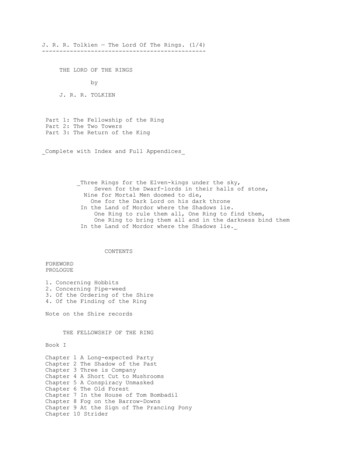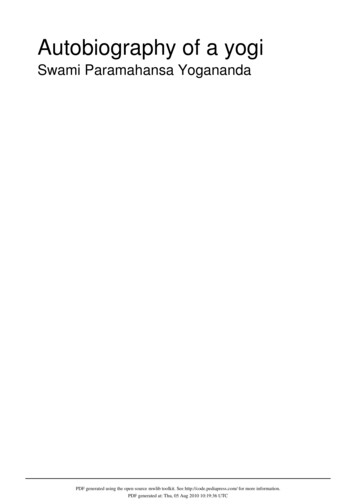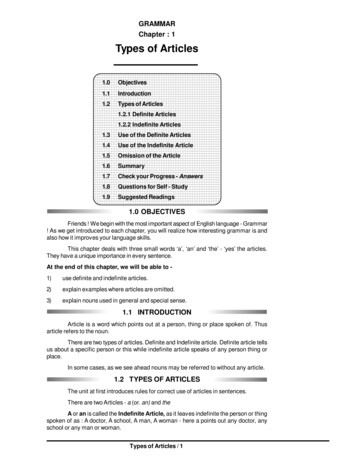
Transcription
GRAMMARChapter : 1Types of Articles1.0Objectives1.1Introduction1.2Types of Articles1.2.1 Definite Articles1.2.2 Indefinite Articles1.3Use of the Definite Articles1.4Use of the Indefinite Article1.5Omission of the Article1.6Summary1.7Check your Progress - Answers1.8Questions for Self - Study1.9Suggested Readings1.0 OBJECTIVESFriends ! We begin with the most important aspect of English language - Grammar! As we get introduced to each chapter, you will realize how interesting grammar is andalso how it improves your language skills.This chapter deals with three small words ‘a’, ‘an’ and ‘the’ - ‘yes’ the articles.They have a unique importance in every sentence.At the end of this chapter, we will be able to 1)use definite and indefinite articles.2)explain examples where articles are omitted.3)explain nouns used in general and special sense.1.1 INTRODUCTIONArticle is a word which points out at a person, thing or place spoken of. Thusarticle refers to the noun.There are two types of articles. Definite and Indefinite article. Definite article tellsus about a specific person or this while indefinite article speaks of any person thing orplace.In some cases, as we see ahead nouns may be referred to without any article.1.2 TYPES OF ARTICLESThe unit at first introduces rules for correct use of articles in sentences.There are two Articles - a (or. an) and theA or an is called the Indefinite Article, as it leaves indefinite the person or thingspoken of as : A doctor, A school, A man, A woman - here a points out any doctor, anyschool or any man or woman.Types of Articles / 1
The is called the Definite Article, as it normally points out some particularperson or thing as : He saw the doctor - where the points out some particular doctor.The indefinite article is used before singular countable nouns e.g. A book, Anorange, A girl The definite article is used before singular countable nouns, plural countableand uncountable nouns, for eg. The book, the books, the milkA or AnThe choice between a and an is determined by sound before a word beginningwith a vowel sound an is used : For eg., an egg, an orange an honest man, an hour. A andAn are used with the singular number only.1.3USE OF THE DEFINITE ARTICLE1.When we talk about a particular person or thing, or one already referred to earlier,2.When a singular noun is meant to represent a whole classfor eg. The cow is a useful animal,The rose is the sweetest of all flowers3.Before some proper names :for eg., oceans and seas: the Pacific, the black searivers : the Ganga, the Nile4.Before the names of certain books :for eg., The Vedas, the Puranas, the Ramayana5.Before names of things unique of their kind; asfor eg., The sun, the sky, the earth6.Before a Proper noun when it is qualified by an adjective or a defining adjectivalclause :for eg., The great Caesar, The immortal Shakespeare7.With Superlativesfor eg., The darkest cloud has a silver lining, This is the best book of elementarychemistry.8.With ordinals :for eg., He was the first man to arrive, The ninth chapter of the book is very interesting.9.Before an adjective when the noun is understood,for eg., The poor is always with us.10.Before a noun to give the force of a Superlativefor eg., The Verb is the word in a sentence.11.As an Adverb with Comparatives :for eg., The more the merrier.12.Uncountable nouns take the when used in a particular sense (especially whenqualified by an adjective of adjectival phrase of clause) for eg., Would you pass methe sugar! The wisdom of Solomon is great1.4 USE OF THE INDEFINITE ARTICLE1.2.3.4.In its original numerical sense of one:for eg., Twelve inches make a foot. Not a word was saidIn a vague sense of a certainfor eg., One evening a beggar came to my doorIn the sense of any, to single out an individual as the representative of a class: foreg., A pupil should obey his teacher A cow is a useful animalTo make a common noun of a proper noun:for eg., A Daniel come to judgement! (A Daniel - a very wise man)English / 2
1.51.2.3.4.OMISSION OF THE ARTICLEBefore names of substances, proper and abstract nouns (uncountable nouns)used in a general sense:for eg., Sugar is bad for your teeth.Gold is a precious metalDelhi is the capital of IndiaWisdom is the gift of heavenBefore plural countable nouns used in a general sense:for eg., Children like chocolatesComputers are used in many officesBefore languagesfor eg., We are studying EnglishThey speak Punjabi at homeBefore predicative nouns denoting a unique position ie., a position that is normallyheld at one time by one person only:for eg., He was elected Chairman of the BoardMr. Mathur became Principal of the School in 1995.1.3 - 1.5 Check your progress1. French is .easy language2. He is .honour to the profession3. Mumbai is .very dear place to live in.4. Which is .longest river in India5. The guide knows .way.1.6 SUMMARYThe given chapter thus explains the significance of articles we can summariesthe chapter in the following points : ‘a’ and ‘an’ are called indefinite articles while ‘the’ is a definite article. Definite article point out to a particular person or a thing or place a. Indefinite articles points out to any person, thing or place. Articles are omitted in case of proper and abstract nouns and plural countablenouns.1.7 CHECK YOUR PROGRESS - ANSWERS1.3 - 1.51. an 2. an3. a4. the 5. the1.8 QUESTIONS FOR SELF - STUDYComplete the following sentences by filling in a or an or the as may be suitable:1.2.3.4.5.6.7.8.French is easy language.Who is girl sitting there ?Which is longest river in India ?The guide knows way.He is honour to this profession.The world is happy place.reindeer is a native of Norway.Mumbai is very dear place to live in.1.9 SUGGESTED READINGS1.2.High School English Grammar and Composition by P. C. Wren, H. Martin (Editedby N.D.V. Prasada Rao)Speaking English Effectively by Mohan Krishna and Singh N.Types of Articles / 3
NOTESEnglish / 4
Chapter : 2Prepositions2.0Objectives2.1Introduction2.2Types of Prepositions2.3Prepositions that requirespecial notice2.4Some Special Prepositions2.5Summary2.6Check your Progress - Answers2.7Questions for Self - Study2.8Suggested Readings2.0 OBJECTIVESDear Friends ! Today we learn about prepositions. Now what are they, What istheir importance in grammar?At the end of this chapter we will be able to explain 1.what prepositions are.2.why and how they are placed before those particular words.3.the various types of prepositions.4.their usage in sentences.2.1 INTRODUCTIONA preposition is a word placed before a noun or a pronoun to show in what relationthe person or thing denoted by it stands in regard to something else.The word preposition means ‘that which is placed before’.The noun or pronoun which is used with a preposition is called its Object.A preposition may have two or more objects as:for eg., The road runs over hill and plain.A preposition is often placed before its object, but sometimes follows it : for eg.,i) Here is the watch that you asked for.ii) What are you looking at?The Preposition for, from, in, on are often omitted before nouns of place or time as:i) for eg., We did it last week.ii) I cannot walk a yard.2.2 KINDS OF PREPOSITIONPrepositions may be arranged in the following classes:Prepositions / 5
1.Simple Preposition :At, by, for, from, in, of, off, on, out, through, till, to, up, with.2.Compound Prepositions :which are generally formed by prefixing a preposition to a Noun, an Adjective or anAdverb.About, Above, Across, Along, Amidst, Among, Before, Behind, Beside, Between,Inside, Outside, Underneath, Within, Without.3.Phrase Preposition :which is a group of words used with the force of a single prepositionfor eg., According to, in accordance with, in place of, along with, in course of, owingto, with a view to, in order to, for the sake of.4.Preposition of Place :About, across, among, before, between below, behind, from, through, near, on,over, under, upon, within, round, without, beside into.5.Preposition of Time :After, at, in, on, during, since, through, throughout, towards, from, during, into,behind.At – is used to indicate a definite point of time:for eg., He came at 8 o’clock, I shall tell him the fact at the right time.In – is used to indicate year, century, morning, evening, time period (in years,hours, days, months) seasons etc as:for eg., I get up early in the morning. It shall be completed in four hours/months.On – is used in expressing days and dates, asfor eg., My school shall reopen on Monday, India was declared independent on 15thAugust 1947.From and To – from is used to indicate the beginning of an action, and to indicatethe time when the action ends.for eg., The Diwali vacation is From 15th October to 22nd October 2005.6.Preposition of Agency, instrumentalitySell goods at auction, sent the parcel by post, heard this through a friend, cut it with7.Preposition of mannerFought with courage, worked with earnestness, won with ease8.Preposition of cause, reason, purposeLabored for the good of humanity, did it for our good, does it from perversity, concealedit through shame, lost his purse through negligence, shivers with fever, took medicinefor cold.9.Preposition of PossessionThe mosque of Omar, a man of means, the boy with red hair10.Preposition of measure, standard, rate, value : asHe charges interest at nine per cent, Stories like these must be taken at what theyare worth.Cloth is sold by the yard. It was one by the tower-clock.English / 6
11.Preposition of contrast, concession : as,For one enemy he has a hundred friends. For one enemy he has a hundred friends.With (in spite of) all his faults I admire him.12.Preposition of Inference, motive, source or origin : asFrom what I know of him, I hesitate to trust him. He did it from gratitude. Lightemanates from the sun. This is a quotation from Milton.Note :- It will be seen that the same preposition, according to the way in which it isused, would have its place under several heads.2.3 PREPOSITIONS THAT REQUIRE SPECIAL NOTICEThe following prepositions require special notice :1.2.We can use in or at with the names cities, towns or villages. We can use in whenwe are talking about a place as an area, we use at when we see it as a point.for eg., We stayed in Mumbai for five days.How long have you lived in this village?We use at to talk about group activities and shops/workplacesfor eg., Did you see Shobha at the party?There weren’t many people at the meeting.3.We use in with the names of streets and at when we give the house-number.for eg., He lives in Church StreetHe lives at 45 Church Street.4.We use on when we think of a place as a surfacefor eg., The dog is lying on the floorPut this picture on the wall.5.Till is used of time and to of placefor eg., He slept till eight o’clockHe walked to the end of the street6.With often denotes the instrument and by the agentfor eg., He killed two birds with one shotHe was stabbed by a lunatic with a dagger.7.Since is used before a noun or phrase denoting some point of time and is precededby a verb in the perfect tenses, asfor eg., I have eaten nothing since yesterday.He has been ill since Monday last.8.In before a noun denoting a period of time, means at the end of, within meansbefore the end of, asfor eg., I shall return in an hour, I shall return within an hour.9.Beside means at (or by) the side of, while besides means in addition to, as:for eg., Besides his children, there were present his nephew and niece.Besides being fined, he was sentenced to a term of imprisonment.2.2 & 2.3 Check your progressFill in the blanks1.The boy fell .the bicycle2.I have gone .your work.3.Let us walk .the shore.4.I have been here.10 O’clock.5.6.He has eaten nothing .yesterday.They drove .mumbai .PunePrepositions / 7
Prepositions of PlaceWhere is it?2.4 SOME SPECIAL PREPOSITIONSSpecial Preposition :than – This word is usually a Conjunction, but is sometimes used as a Preposition,for eg., I cannot accept less than forty rupees for this article.but – As a rule but is a conjunction, when used as a preposition, but means‘except’, ‘with the exception of’:for eg., None but the brave deserves the fair.She returned all the gifts but one.a – In some sentences, a is a weakened form of the preposition on,for eg., Her wages are ten rupees a dayI meet him once a weekEnglish / 8
Prepositions of TimePicture It Clip ArtPrepositionExampleat(a time)“I got to work at 8.00this morning.”on(a day)“I’ll see you onTuesday.”on(a date)“I have anappointment on the 31st.”in(a month)“My birthday is inJune”in(a year)“I was born in 1959”in(the morning)“I get up in themorning.”2.5 SUMMARYSo Friends ! We saw words that show the relation between two words. Prepositionscan be summarized as : The basic types of prepositions are simple, compound (Prefixing a noun, adjectiveor adverb) and phrase prepositions. The other types are closefisted as prepositions of time, place, reason, measure etcas their meaning indicates. Some words like than and but which are actually conjunctions, may serve thepurpose of prepositions. Last but not the least, using the correct preposition is very important. It makes thesentence sound grammatically perfect.Prepositions / 9
Picture It Clip ArtPrepositionExamplein(the afternoon)“I have lunch in theafternoon.”in(the evening)“I go home in theevening.”at(night)“I go to bed at night.”in“It usually snows in2.6 CHECK YOUR PROGRESS - ANSWERS2.2 & 2.3 : 1. off 2. through 3. along 4. since 5. since 6. from to2.7 QUESTIONS FOR SELF - STUDY1.Enlist the different types of prepositions.2.Define preposition.3.In what cases is preposition in used?Fill in the blanks with suitable prepositions:1.What is that me?2.He has not yet recovered his illness.3.The village was destroyed fire.4.The exercise was written me a Camlin pen.5.They drove Mumbai Pune.6.I have not seen him Wednesday last.7.We suffered your neglect.8.You, boys must settle it yourselves.9.The moon does not shine its own light.10. He died his country.2.8 SUGGESTED READINGS1.2.High School English Grammar and Composition by P. C. Wren, H. Martin (Editedby N.D.V. Prasada Rao)Speaking English Effectively by Mohan Krishna and Singh N.English / 10
Prepositions of MovementPrepositions / 11
NOTESEnglish / 12
Chapter : 3Tenses3.0Objectives3.1Introduction3.2Present Tense3.33.2.1Simple Present Tense3.2.2Present Continuous Tense3.2.3Present Perfect tense3.2.4Present Perfect continuous TensePast Tense3.3.13.3.23.3.33.3.43.4Simple past TensePast Continuous TensePast Perfect TensePast perfect continuous TenseFuture Tense3.4.13.4.23.4.33.4.4Simple Future TenseFuture Continuous TenseFuture Perfect TenseFuture Perfect continuous Tense3.5Summary3.6Check your Progress - Answers3.7Questions for Self - Study3.8Suggested Readings3.0 OBJECTIVESSo Friends ! We come to a very important topic in grammar ie. Tense. Tenseshows the time and state of any action. Any and every action and event occurs in a timeframe. Hence every sentence too is referred to a time frame and that is tense. Afterstudying this chapter you would be able to use tenses correctly.3.1 INTRODUCTIONTense is defined as that form of a verb which shows the time and the state of anaction or event.Accordingly there are three major tenses :Present Tense : Action or event occurring in the presenteg. I WritePast Tense : Action/event that has occurred in the past.e.g. I wroteFuture Tense : Action/ event that is likely to occur in the future.e.g. I will write.We may define Tense as that form of a Verb which shows the time and the state ofan action or event.There are three main tenses, the Present, the Past and the Future. A verb mayrefer to present, past or future time. The tense of a verb shows the time of an action or anevent.Tenses / 13
3.2 PRESENT TENSEThe present tense has four forms :I writeSimple PresentHere the verb shows that the action is mentioned simply, without anything beingsaid about the completeness or incompleteness of the action.I am writingPresent ContinuousIt shows the action is mentioned as incomplete or continuous, or as still going onI have writtenPresent PerfectThe verb shows that the action is mentioned as finished, complete at the time ofspeakingI have been writingPresent Perfect ContinuousThe verb shows that the action is going on continuously, and not completed atthis present moment.As the Present Tense has four forms, similarly the Past Tense and Future Tensealso has the four forms.I wroteI was writingI had writtenSimple PastPast ContinuousPast PerfectI had been writingPast Perfect ContinuousAnd:I shall/will writeSimple FutureI shall/will be writingFuture ContinuousI shall/will have writtenFuture PerfectI shall have been writing Future Perfect Continuous3.2.1 Simple Present TenseThe Simple Present is used as:1.To express a habitual action; asfor eg., He drinks tea every morning, My watch keeps good time2.To express general truths; asfor eg., The sun rises in the east, Fortune favors the brave.3.In exclamatory sentences beginning with here and there to express what is actuallytaking place in the present; asfor eg., There goes the bus!4.In vivid narrative, as substitute for the Simple Past;for eg., Immediately the Sultan hurries to his capital5.To express a future event that is part of a fixed timetable or fixed programme;for eg., The next flight is at 7.00 tomorrow morning, When does the coffee housereopen?3.2.2 Present Continuous TenseThe Present Continuous is used in1.For an action going on at the time of speaking; asfor eg., The boys are playing cricket.English / 14
2.For a temporary action which may not be actually happening at the time of speaking;asfor eg., I am reading ‘Great Expectations’ (though not at this very moment).3.For an action that has already been arranged to take place in the near future;for eg., I am going to the cinema tonight. My uncle is arriving tomorrow.3.2.3 Present Perfect tense1.To indicate completed activities in the immediate past;for eg., He has just left. It has just struck ten.2.To express past actions whose time is not given and not definite;for eg., Have you read ‘Gulliver’s Travels’? Mr. John has been to America.3.To describe past events when we think more of their effect in the present than of theaction itself;for eg., I have finished my work (ie., I am free now).4.To denote an action beginning at some time in the past and continuing up to thepresent moment;for eg., We have lived here for ten years.3.2.4 Present Perfect continuous Tense1.It is used for an action which began at some time in the past and is still continuing;for eg., They have been building the bridge for several months (and is still building).2.The tense is also sometimes used for an action already finished. In such cases thecontinuity of the activity is emphasized as an explanation of something.for eg., ‘Why are your clothes so wet’? – ‘I have been watering the garden’.3.3 PAST TENSESimple past Tense1.The Simple Past is used to indicate an action completed in the past.for eg., He received his letter a week ago. She left school last year.2.Sometimes it is used without an adverb of time. In such cases the time may beeither implied or indicated by the context.for eg., Babar defeated Rana Sanga at Kanwaha. I learnt Hindi in Nagpur.3.It is used for past habits; asfor eg., He studied many hours everyday. She always carried an umbrella.3.3.1 Past Continuous Tense1.2.The past continuous is used to denote an action going on at sometime in the past,the time of the action may or may not be indicated;for eg., We were listening to the radio all evening.This tense is also used with always, continually for persistent habits in the past;for eg., He was always grumbling.3.3.2 Past Perfect Tense1.The Past Perfect describes an action completed before a certain moment in thepast.for eg., I met him in New Delhi in 1996, I had seen him last five years before.Tenses / 15
The Present TensesPresent SimplePresent SimpleUsed to say whatsomeone usuallydoesI always study English on Tuesday.PresentProgressive/ContinuousPresent ProgressiveUsed to say whatsomeone is doingnowI am studying English nowUsed to showunfinished timeI have studied English twice thisweek.Present PerfectSimplePresent Perfect SimplePresent Perfect Progressive/ContinuousPresent PerfectProgressive2.Used to say howlong someoneI have been studying English for 2 years.has been doingI have been studying English since 1997.If two actions happened in the past, it may be necessary to show which actionhappened earlier than the other. The Past Perfect is mainly used in such situations.The Simple Past is used in one clause and the Past Perfect in the other.for eg., When I reached the station the train had started (so I couldn’t get into thetrain).I had done my exercise when Hari came to see me.3.3.3 Past perfect continuous TenseThe Past Perfect Continuous is used for an action that began before a certain pointin the past and continued up to that time;for eg., At that time he had been writing a novel for two months.English / 16
The Past TensesSimple PastSimple PastUsed to show acompleted actionI studied English last Saturday.Past Progressive/ContinuousPast ProgressiveOften used to saywhen somethingwas being doneor what washappening whensomething elsehappenedI was studying English last Monday whenmy friend rang.The past of havedone. Used tosay whensomething wasdone by.I had done my English homework by 6.30pm last Saturday.I was studying English at 5pm last Monday.Past Perfect SimplePast Perfect SimpleI had done my English homework by thetime I ate dinner last Saturday.3.4 FUTURE TENSE3.4.1 Simple Future Tense1.The Simple Future Tense is used to talk about things which we cannot control. Itexpresses the future as fact;for eg., We will know our exam results in May.2.We use this tense to talk about what we think or believe will happen in the future;for eg., I think Pakistan will win the match.3.We can use this tense when we decide to do something at the time of speaking;for eg., It is raining, I will take an umbrella.4.The Simple Present is often used for future time in clauses with if, unless, when,while, as ( while), before, after, until, by the time and as soon as. The SimpleFuture Tense is not used in such cases.for eg., I won’t go out if it rains. Can I have some milk before I go to bed?Tenses / 17
Past Perfect Progressive/ContinuousPast PerfectProgressiveThe past of havebeen. Used toshow how longsomething wasdone for by aI’d been doing my English homework for 30minutes when my friend rang last Saturday.I’d been doing my English homework for 30certain time. minutes by 1 pm lastSaturday.The Future TensesThe future can be indicated in several different ways in English. It is often created with the useof auxiliaries: “She will be a student.”, “She is going to drive a new car.” English can even create thefuture by using the simple present (used for timetables,programs etc.), “The train arrives at 10pm” orthe present progressive (used for future plans), “He is collecting his mother from the station tonight.”Simple Future (uses will or shall or going to base form)Simple Future(Some uncertainty)Decide to dosomething at thetime of speakingI think I’ll do my English homework tonight.Simple Future(Certain)Have alreadydecided orarranged to dosomethingI am going to study English next Saturday.Present Continuous TenseWe use present continuous tense when we talk about something that we haveplanned to do in the future;for eg., I am going to Shimla tomorrow. Mr. Hari is arriving this evening.3.4.2 Future Continuous TenseIt is used to talk about actions which will be in progress at a time in the future.for eg., I suppose it will be raining when we start.This time tomorrow I will be sitting on the beach in Singapore.We also use this tense to talk about actions in the future which are already plannedor which are expected to happen in the normal course of things;for eg., I will be staying here till Sunday. He will be meeting us next week.English / 18
Future Progressive/Continous (uses will be, shall be or going to be -ing form)Future Progressive(Some uncertainty)The Englishlesson shouldbegin at 7.30 andend at 9.15, sothe personshould bestudying at 7.30(but the lessonmight start late).I will be starting my English lesson at 7.30pm.Future Progressive(Certain)The Englishlesson begins at7.30 and ends at9.15, so he’scertain to bestudying when hisfriend arrives at 8.00I am going to be studying English when myfriends arrive at 9.00 pm.Future Perfect Simple (uses will have or shall have past participle)Future PerfectSimpleUsed to saysomething willalready becomplete by atime.I will have already done my Englishhomework by the time I eat dinner onSaturday.Future Perfect Progressive/Continuous (uses will have been or shall have been -ingform)Future PerfectProgressiveUsed to say howlong somethingwill have beenhappening in thefuture by a certainI will have been studying English for 30minutes when my friends arrive.Tenses / 19
3.4.3 Future Perfect TenseIt is used to talk about actions that will be completed by a certain future time;for eg., I shall have written my exercise by then.By the end of this month I will have worked here for five years.3.4.4 Future Perfect continuous TenseThe Future Perfect Continuous Tense is used for actions which will be in progressover a period of time that will end in the future;for eg., By next March we shall have been living here for four years.3.2-3.4 - Check your progressChange the tense of the verb given in the bracket as required.1.I.(Study) all night long.2.Please .((takes) your suncoat when you go3.I .((go) for a walk every evening.4.Preeti .((clean) the table just now.5.When, we went to cinema, the film .((start).6.He .((receive) the cheque from the bank yesterday.7.My mom .((stay) with us for the next six months.8.She always .((speak) softly.9.Do you think you .((see) me somewhere before?10.This paper .((appears) Twice weekly.out.3.5 SUMMARYTense forms an integral part of grammar as every sentence occurs in one or otherform of Tense. The summary of Tense can be studied as :*The three basic types of tenses are the Present, Past and Future Tense.*Each of the above types can be classified as simple, perfect, continuous and perfectcontinuous.*Continuous Tense indicates the activity going on in the respective tense while perfectcontinuous indicates activity that has begun and is continuing.*To understand Tense or to convert a sentence from one tense to another, it isessential to concentrate on the verb.3.6 CHECK YOUR PROGRESS - ANSWERS3.2-3.4 1. Have been studying, 2. take 3. go 4. has cleaned 5. had already started6. received 7. will be staying ? 8. speaks 9. have seen 10. appears3.7 QUESTIONS FOR SELF - STUDY1.2.Define TenseState the types of Present Tense with example.English / 20
3.4.State the types of Past Tense with example.State the types of Future Tense with example.I)Point out the verbs in the following sentences and name their tenses:1.2.3.4.5.God forgive you!He told me that he had finished the work.He is waiting for you in the compound.Beware lest something worse should happen to you.The farmer is cutting the corn which has ripened.II)Choose the correct verb form from those given in brackets:1.I him only one letter up to now (sent, have sent, send)2.This paper twice weekly (is appearing, appearing, appears)3.Every day last week my Aunt a plate.(breaks, broke, was breaking)4.The town its appearance completely since 1960. (is changing, Changed,has changed)5.When we went to the cinema, the film (already started, had alreadystarted, would already start)6.She has bought some cloth; she herself a shirt. (will make, is going tomake)7.This book is not long. I it by lunch time. (will be reading, will have read).8.I into town later on. Do you want a lift? (drive, will be driving).9.Men to abolish wars up to now, but may be they will find a way in thefuture. (never managed, have never managed, will have never managed)10.Did you think you me somewhere before? (have seen, had seen, wereseeing)3.8 SUGGESTED READINGS1.High School English Grammar and Composition by P. C. Wren, H. Martin (Editedby N.D.V. Prasada Rao)2.Speaking English Effectively by Mohan Krishna and Singh N. Tenses / 21
NOTESEnglish / 22
Chapter : 4Parts of Speech4.0Objectives4.1Introduction4.2Definition of various parts of speech4.3Summary4.4Check your Progress - Answers4.5Questions for Self - Study4.6Suggested Readings4.0 OBJECTIVESFriends ! Words together make up a sentence. Have you ever wondered, Whatthese words are? There are different types of words that are classified into various classes.These are known as parts of speech.In depth study of this chapter would enable you to 1)explain the various parts of speech like noun, adjective, verb etc.2)3)4)5)explain their role in the structure of a sentence.define various parts of Speech.describe their role in the structure of a sentence.identify various parts of speech correctly.4.1 INTRODUCTIONWords are divided into different kinds or cl
The unit at first introduces rules for correct use of articles in sentences. There are two Articles - a (or. an) and the A or an is called the Indefinite Article, as it leaves indefinite the person or thing spoken of as : A doctor, A school, A man, A woman - here a points out any doct

